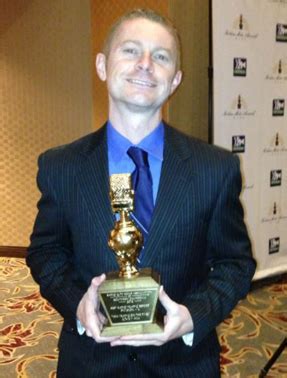A Quote by Thomas Hardy
Indifference to fate which, though it often makes a villain of a man, is the basis of his sublimity when it does not.
Related Quotes
A human being without the proper empathy or feeling is the same as an android built so as to lack it, either by design or mistake. We mean, basically, someone who does not care about the fate which his fellow living creatures fall victim to; he stands detached, a spectator, acting out by his indifference John Donne's theorem that "No man is an island," but giving that theorem a twist: that which is a mental and a moral island is not a man.
The principal, the only, thing a man makes, is his condition of fate. Though commonly he does not know it, nor put up a sign to this effect, "My own destiny made and mended here." (Not yours.) He is a master workman in the business. He works twenty-four hours a day at it, and gets it done. Whatever else he neglects or botches, no man was ever known to neglect this work. A great many pretend to make shoes chiefly, and would scout the idea that they make the hard times which they experience.
Nothing that is not a real crime makes a man appear so contemptible and little in the eyes of the world as inconsistency, especially when it regards religion or party. In either of these cases, though a man perhaps does but his duty in changing his side, he not only makes himself hated by those he left, but is seldom heartily esteemed by those he comes over to.
I cannot say that I am in the slightest degree impressed by your bigness, or your material resources, as such. Size is not grandeur, and territory does not make a nation. The great issue, about which hangs true sublimity, and the terror of overhanging fate, is what are you going to do with all these things?
It is God's earth out of which man is taken. From it he has his body. His body belongs to his essential being. Man's body is not his prison, his shell his exterior, but man himself. Man does not "have" a body; he does not "have" a soul; rather he "is" body and soul. Man in the beginning is really his body. He is one. He is his body, as Christ is completely his body, as the Church is the body of Christ
He who gives himself to a lover because he is a good man, and in the hope that he will be improved by his company, shows himself to be virtuous, even though the object of his affection turn out to be a villain, and to have no virtue; and if he is deceived he has committed a noble error. For he has proved that for his part he will do anything for anybody with a view to virtue and improvement, than which there can be nothing nobler.
Man is never honestly the fatalist, nor even the stoic. He fights his fate, often desperately. He is forever entering bold exceptions to the rulings of the bench of gods. This fighting, no doubt, makes for human progress, for it favors the strong and the brave. It also makes for beauty, for lesser men try to escape from a hopeless and intolerable world by creating a more lovely one of their own.
The rich man has his motorcar, His country and his town estate, He smokes a fifty-cent cigar And jeers at Fate. He frivols through the livelong day, He knows not Poverty, her pinch. His lot seems light, his heart seems gay; He has a cinch. Yet though my lamp burns low and dim, Though I must slave for livelihood- Think you that I would change with him? You bet I would!
Very often pessimistic people speak against their own desire. They want to undertake some work, and they say, 'I will do this, but I don't think I shall succeed in it.' Thus they hinder themselves in their path. Man does not know that every thought makes an impression on the consciousness and on the rhythm with which the consciousness is working. According to that rhythm that reflection will come true and happen; and a man proves to be his own enemy by his ignorance of these things.







































